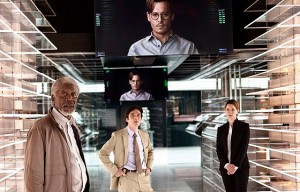
Cinematographer Wally Pfister has been responsible for shooting some of the best looking movies in recent years, including The Prestige and Inception (for which he won an Oscar). His directorial debut, Transcendence, is a highly ambitious effort, attempting to explore concepts like technological singularity. As expected, it looks fantastic and has an interesting conceit, but can’t quite pull together its big ideas in a cohesive manner.
In a very general sense, the singularity concept suggests that as artificial intelligence progresses, it will reach the point at which it becomes more knowledgeable and capable than all of humankind. As a result, it will influence and change the world as it sees fit in ways the human mind may not comprehend. The concept of machines taking control has been used to a degree in several science fiction films (like The Terminator), often presenting a nightmarish scenario. With this story, Will Caster (Johnny Depp) is a researcher developing PINN, a sentient computer possessing AI. Fearing the possibility of an oncoming singularity scenario, Caster is targeted for assassination by an anti-technological terrorist group. Determined to change the world for the better, Caster’s wife and fellow scientist Evelyn (Rebecca Hall) attempts to install his human consciousness into PINN.
 While the process at first seems successful, it becomes difficult to determine whether the machine truly possesses Caster’s personality, morals and ethics or if program is manipulating others with the data to reach its ultimate goal. The machine’s technological form develops and creates huge medical advances, but also wants to unite the world in a shared consciousness. Those concerned about the inherent danger include fellow professors Max (Paul Bettany), Joseph (Morgan Freeman) and government agent Buchanan (Cillian Murphy).
While the process at first seems successful, it becomes difficult to determine whether the machine truly possesses Caster’s personality, morals and ethics or if program is manipulating others with the data to reach its ultimate goal. The machine’s technological form develops and creates huge medical advances, but also wants to unite the world in a shared consciousness. Those concerned about the inherent danger include fellow professors Max (Paul Bettany), Joseph (Morgan Freeman) and government agent Buchanan (Cillian Murphy).
In early parts of the film, the story appears to be taking the high road. As expected, the leads are excellent and there are interesting discussions between the characters in which they express the benefits, as well as reservations about their work. There’s a good deal of tension as the leads test the AI and come to different conclusions as to just how much of it really is Carter. Technically, the movie is marvelous as well. It features beautiful macro photography of water droplets falling through the air. Additionally, there are some striking images featuring mechanized microbes that repair and reform both inanimate objects and human beings.
However, as the story progresses it becomes clear that the script isn’t entirely sure how to wrap itself up. Ultimately, the movie becomes an explosion heavy showdown between man and machine. And when characters bring to the table a clichéd theory suggesting how to stop the super-intelligent, transcendent PINN, just about all credibility flies out the window. Upon first viewing, the final twist may give its leads an emotional moment, but it doesn’t seem to make sense given the actions seen previously in the film.
As a viewer, the effort involved in attempting a heady sci-fi thriller is appreciated. It’s unfortunate that as it progresses it abandons some of the more interesting themes and reverts to a very conventional and unimpressive climax. Transcendence is a curious oddity, but one that eventually defies understanding, sadly, for the wrong reasons.


